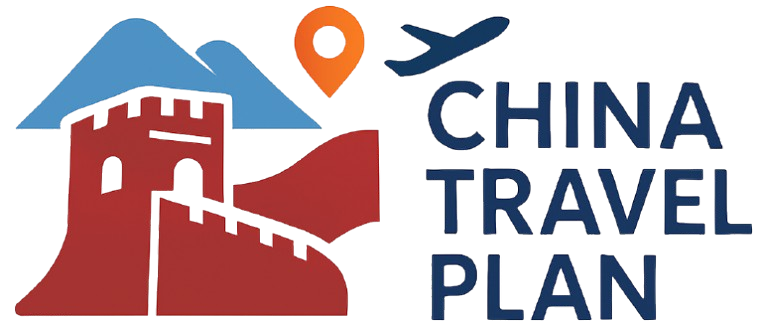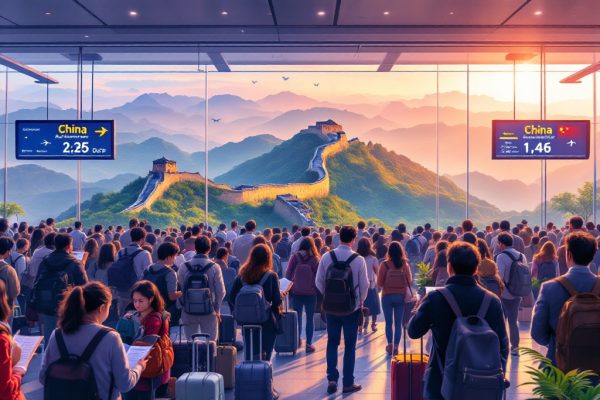Budget Travel to China: How to Plan Affordable Trips
Dream of exploring China’s wonders without breaking the bank? Discover how to travel through China on a budget of $10-$50 per day! From iconic landmarks like the Great Wall ($6 entrance fee) and Forbidden City ($8) to affordable hostels starting at $5 a night, your adventure awaits. Learn how to navigate transportation costs, savor delicious street food for just $5 a day, and unlock hidden gems in less-traveled regions. Uncover insider tips on maximizing your budget, from utilizing public transport to embracing local dining experiences. Start planning your unforgettable Chinese adventure today!
Important information

- Daily expenses can range from $10 to $50, with dorm beds from $5/night and mid-range hotels costing $40-$120/night.
- Flights from major US cities typically cost between $500 and $1500 roundtrip.
- Train travel is significantly cheaper than flying (often up to 75% less) and overnight trains can save on hotel costs.
- Utilize public transport within cities (subway $0.30-$0.80, buses $0.20-$0.50) and consider less-traveled regions like Yunnan, Guangxi, or Chongqing for lower costs.
- Embrace cashless payments using Alipay or WeChat Pay to avoid fees and exchange rate issues.
Introduction to Budget Travel in China
Explore China affordably! Daily expenses can range from $10 to $50. Find dorm beds for as low as $5 per night, while mid-range hotels cost between $40 and $120, depending on the city. A comprehensive daily budget of $146 covers accommodation, transportation, meals, and activities. China offers diverse experiences, from stunning landscapes and delicious cuisine to rich cultural heritage. Simplified visa requirements make exploration easier than ever. Attraction entrance fees are budget-friendly. For example, the Great Wall costs about $6, and the Forbidden City is around $8. A daily activity budget of $24 is usually sufficient, as many cultural experiences are inexpensive.
Accommodation
- Dorm bed: from $5 per night,
- Mid-range hotels: $40 – $120 per night.
Attractions
- Great Wall: approximately $6,
- Forbidden City: around $8.
Experience China’s diverse landscapes, tantalizing cuisine, and vibrant cultural heritage without overspending.
Understanding Travel Costs in China
Post-pandemic travel in China has become pricier, making careful budgeting essential. When planning your trip, factor in expenses like flights, accommodation, food, and transportation. To illustrate, a recent two-month trip for two people cost approximately €2938.8, or roughly €22 per person per day, covering meals, lodging, transport, and entrance fees.
Navigating Cities
Navigating cities remains affordable. Subway rides cost between $0.30 and $0.80. Bus tickets are even less, ranging from $0.20 to $0.50. A three-day trip relying on public transport might cost around $20.
Longer Train Journeys
Longer train journeys can significantly impact your budget. These journeys can range from $10 to $100.
Don’t forget to include visa fees and travel insurance in your overall budget.
Typical Costs of Flights, Accommodation, and Food
Plan your dream trip to China! Roundtrip economy flights from major US cities typically cost between $500 and $1500. Accommodation options cater to every budget, from hostels and guesthouses for around $10 per night to comfortable mid-range hotels priced between $50 and $100. Enjoy delicious street food and local meals for approximately $5 a day, while restaurant dining averages $20 to $30 per meal. Don’t forget to include transportation and activities in your travel budget.
Flights
Roundtrip economy flights from major US cities typically range between $500 and $1500.
Accommodation
Hostels and guesthouses offer budget-friendly options starting at $10 per night, while comfortable mid-range hotels cost between $50 and $100.
Food
Savor delicious street food and local meals for around $5 a day. Restaurant dining experiences average between $20 and $30 per meal.
Additional Expenses
Remember to factor in transportation and activities when planning your travel budget.
Transportation Costs: Trains, Buses, and More
Traveling in China offers diverse transportation options for every budget. For long distances, high-speed rail is an excellent choice. Within cities, efficient and affordable public transit systems are readily available. Subway fares are remarkably low, typically ranging from $0.30 to $0.80, while bus tickets are even cheaper, usually costing between $0.20 and $0.50. Longer train journeys are more expensive, with fares varying from $10 to $100. Budget travelers can comfortably explore a city using public transport for approximately $20 over three days. Train travel also presents significant savings compared to air travel, often up to 75% less. Taking an overnight train can further stretch your travel budget by eliminating hotel costs.
Visa Fees and Related Expenses
Visa fees for China vary based on your nationality and the type of visa required. For example, a single-entry visa typically costs US citizens between $140 and $160, while UK citizens pay approximately £151. These prices can change, so it’s always recommended to confirm the latest fees with the nearest Chinese embassy or consulate. Travelers from certain countries may be eligible for a complimentary 144-hour transit visa, a convenient option for short stays.
Cost-Cutting Tips for Traveling in China
Traveling during the off-season, such as winter, can significantly reduce flight and accommodation costs. Consider exploring less-traveled regions like Yunnan, Guangxi, or Chongqing, which are typically more budget-friendly than bustling metropolises like Beijing or Shanghai. Utilize public transport. Buses and subways are efficient and economical ways to navigate cities. For longer journeys, opt for train travel over flying, it’s often cheaper and offers scenic views. Don’t overlook free attractions. Parks and temples provide cultural immersion without the hefty price tag. Embrace local experiences by dining at local restaurants and savoring street food for authentic, affordable meals. Bargain respectfully at markets to find unique souvenirs at better prices. Traveling with a group can unlock discounts on tours and accommodations.
Tips for Finding Budget-Friendly Flights and Accommodation
- Travel during the off-season, such as winter, to reduce costs.
- Explore less-traveled regions like Yunnan, Guangxi, or Chongqing.
- Consider traveling with a group to unlock discounts on accommodations.
Tips for Saving Money on Transportation and Activities
- Utilize public transport like buses and subways within cities.
- Choose train travel over flying for longer journeys—it’s often cheaper and offers scenic views.
- Explore free attractions like parks and temples for cultural immersion.
Tips for Enjoying Authentic and Affordable Meals
- Dine at local restaurants and try street food for authentic, affordable meals.
Tips for Finding Unique Souvenirs
- Bargain respectfully at markets to find unique souvenirs.
Plan Well in Advance and Be Flexible
Planning ahead is key to saving money on your trip. Booking flights and accommodations early, especially during peak season, can significantly reduce costs. Flexibility with your travel dates also helps. Consider visiting during the shoulder seasons (spring or autumn) for pleasant weather and fewer tourists. Another money-saving tip is to explore alternative airports or train stations. Flying into a smaller, slightly further airport can often be cheaper, allowing you to use affordable local transport to reach your final destination. Similarly, taking a train to a nearby city followed by a local bus can be more economical than a direct high-speed train. These simple strategies can stretch your travel budget further.
Save on Flights and Accommodation
Book your flights and accommodations well in advance, especially if traveling during peak season. This can lead to significant savings.
Be Flexible with Travel Dates
Consider traveling during the shoulder seasons (spring or autumn) for better deals and fewer crowds. You’ll still enjoy pleasant weather.
Explore Alternative Airports
Flying into a smaller airport a bit further from your destination can often be cheaper. Factor in affordable local transport to reach your final stop.
Consider Train and Bus Combinations
Sometimes, taking a train to a nearby city and then using a local bus is more economical than a direct high-speed train.
Travel Off-Peak to Save Money
Enjoy significant savings and escape the hustle and bustle by traveling during the winter off-season. You can save anywhere from $100 to $250. Hotels and attractions reduce their prices, and airlines often offer fares discounted by up to 60%. A major advantage is encountering fewer crowds at popular destinations. However, avoid traveling during Chinese public holidays, as prices tend to increase significantly during these periods.
Use Lower-Price Transport Options
Traveling within China is both easy and affordable, thanks to its extensive public transportation network. For long-distance travel, comfortable trains connect major cities, often offering lower fares when booked in advance. High-speed trains are a cost-effective alternative to flying, especially for longer journeys. Local buses are convenient for shorter trips, providing an economical way to explore different regions. Public transport apps streamline travel planning, making navigation and ticket purchasing hassle-free. Within cities, walking and cycling are budget-friendly and healthy ways to discover local markets and scenic routes at your own pace.
Travel between cities
- Long-distance trains provide comfortable journeys between cities, often with lower fares when booked ahead.
- High-speed trains offer a cost-effective alternative to flying, especially for longer distances.
Travel within cities
- Local buses are convenient and economical for shorter trips.
- Walking and cycling provide budget-friendly and healthy ways to explore, allowing visits to local markets and scenic routes at your own pace.
Experience Free Sights and Local Culture
Exploring China on a budget offers a wealth of enriching experiences without breaking the bank. Immerse yourself in local culture with free tai chi demonstrations in parks, leisurely strolls along Shanghai’s vibrant Bund, and relaxing moments on Hong Kong’s beautiful beaches. Many cities host free cultural festivals and events, providing authentic glimpses into local traditions. For a deeper cultural immersion at an affordable price, explore sites like Xi’an’s Xianglu Temple and other lesser-known gems. Savor authentic and budget-friendly meals by sampling the diverse street food scene. Connect with local history by joining a free walking tour for a unique city experience.
Free Activities
- Enjoy tai chi demonstrations in local parks.
- Stroll along Shanghai’s Bund.
- Relax on Hong Kong’s beaches.
- Attend free cultural festivals and events.
Affordable Cultural Experiences
- Explore Xi’an’s Xianglu Temple and other lesser-known sites.
- Sample diverse and budget-friendly street food.
- Join free walking tours for unique city experiences.
Eat Like a Local: Affordable Dining Options
Experience the vibrant culinary scene of China without breaking the bank. Street food offers a delicious and economical way to explore local cuisine, with meals typically costing between 7 and 15 CNY. Local restaurants also provide budget-friendly options, averaging around 20 CNY per meal. For smaller, lighter fare, “xiao pan” is an excellent choice. Authentic and inexpensive local favorites include dumplings, baozi, jianbing, and noodles. To maximize both flavor and value, explore bustling markets and family-run establishments.
Bargain for Souvenirs and Save
Bargaining in bustling markets like Beijing’s Panjiayuan or Shanghai’s Hongqiao Pearl Market can lead to significant savings. It’s practically a tradition, allowing travelers to find unique souvenirs and stretch their budgets. Items like silk scarves or jade pendants can often be purchased for a fraction of the initial asking price through respectful negotiation. A good strategy is to start your offer low.
Travel in Groups for Discounts
Group travel to China offers significant cost advantages. Sharing expenses like accommodations, transportation, and tours leads to substantial savings, sometimes even reaching 50% for larger groups.
Beyond the financial benefits, group tours provide a nice balance of structured activities and independent exploration, allowing for both guided experiences and personal discovery.
Accommodation Options for Budget Travelers
Traveling to China on a budget? Finding affordable accommodation is easier than you think. Explore these options: hostels, guesthouses, budget hotels, and homestays. Hostels are an excellent choice for budget travelers, often providing amenities like English-speaking staff and travel resources. Guesthouses and budget hotels also cater to cost-conscious travelers. For a unique cultural experience, consider a homestay, which often comes at a lower cost and offers a glimpse into local life.
Location and Pricing
Location plays a key role in accommodation costs. Smaller towns and suburbs generally have lower prices than major cities. However, big cities offer a wider range of attractions and activities.
Finding the Best Deals
Utilize online booking platforms to compare prices, read reviews, and discover various options like dormitories or guesthouses. For a truly immersive and free experience, consider Couchsurfing, connecting travelers with locals who offer accommodation and cultural exchange.
Book in Advance. Secure your accommodations, especially hostels, ahead of time, particularly during peak season, as they tend to fill up quickly.
Stay in Chinese Hostels Instead of Hotels
Looking for budget-friendly accommodation in China? Consider hostels. They offer comfort and convenience, often matching hotels in amenities. Many hostels provide both private rooms and dorm beds, and their central locations simplify exploration. English-speaking staff and travel resources are readily available. Dorm beds cost between 70-110 CNY per night, while private rooms are around 200-300 CNY, leaving you with more money for experiences. Budget hotels are available for about 150 CNY, but hostels offer a unique social environment where you can connect with fellow travelers, enhancing your trip.
Hostels
- Comfortable and convenient accommodations, often rivaling hotels in amenities.
- Dorm beds priced between 70-110 CNY per night.
- Private rooms cost around 200-300 CNY per night.
Benefits
- Central locations make exploring easy.
- English-speaking staff and travel resources are readily available.
- Unique social atmosphere to connect with other travelers.
Budget Accommodation in Big Cities
Traveling in China on a budget? Here’s what you need to know about affordable accommodations:
Hostels and Guesthouses
- Dorm beds: 70 to 110 CNY per night.
- Private rooms: 200 to 300 CNY per night.
Other Budget-Friendly Options
- Budget hotels: Average 150 CNY per night.
- Campsites: As low as 20 CNY per night.
Book in advance, especially for popular cities like Beijing and Shanghai, to secure the best deals and avoid higher prices. Smaller cities such as Chengdu and Kunming usually offer even lower accommodation costs. Planning your accommodations ahead of time will help stretch your travel budget.
Transportation Tips for Budget Travel in China
Traveling by train offers a cost-effective way to explore China. High-speed rail connects major hubs, while slower trains provide budget-friendly travel for shorter distances. Booking tickets in advance is recommended, particularly during peak seasons.
Train Travel in China
High-speed rail connects major hubs, offering rapid transit between cities. For shorter distances, slower trains provide a budget-friendly option. Booking tickets in advance, especially during peak seasons, is highly recommended.
Public Transportation within Cities
Public transportation within cities is both efficient and affordable. Cities such as Beijing and Shanghai have extensive subway networks, and buses offer comprehensive coverage at a low cost. Using a transportation card can further reduce fares.
Making the Most of Train Travel
Traveling by train in China is an economical choice, often up to 75% less expensive than flying. Overnight journeys eliminate hotel costs, further stretching your budget. China’s high-speed rail system offers a comfortable and efficient travel experience, making it a favorite among budget-conscious travelers. For shorter distances, hard seats provide additional savings.
Using Public Transportation in Cities
Traveling by bus in China is an economical and immersive way to experience the country’s vibrant cities. Public transportation offers a unique perspective on local life, all while keeping your travel costs low. Hop on a bus and discover the urban landscape in an authentic and affordable way.
Exploring Less Expensive Destinations in China
Discover the captivating treasures of Southwest China. Explore Yunnan Province, home to the UNESCO World Heritage site of Lijiang and the dramatic Tiger Leaping Gorge. Venture to nearby Guangxi and witness the otherworldly karst mountains and Li River of Guilin. Further inland, Chongqing municipality awaits, offering the Dazu Rock Carvings and the historic Ciqikou Ancient Town, a perfect blend of cultural richness and natural beauty.
Chengdu
See giant pandas at Chengdu’s renowned research base and savor the fiery flavors of Sichuan cuisine.
Nanning
Visit Nanning, the capital of Guangxi, and access the majestic Detian Waterfall.
Guilin
Explore the picturesque Reed Flute Cave amidst Guilin’s breathtaking scenery.
These dynamic cities offer diverse and affordable adventures. Experience the beauty and culture of Southwest China.
Hidden Gems in Yunnan, Guangxi, and Chongqing
China offers incredible sights, from Yunnan’s breathtaking Yuanyang Rice Terraces to the equally stunning Longji terraces in Guangxi. Near Chongqing, the Dazu Rock Carvings, a UNESCO World Heritage site, provide a rich cultural experience. These destinations are also easier on the wallet than major tourist hubs.
Discover Chengdu, Nanning, and Guilin
Chengdu’s Panda Research Base is a must-see attraction, but don’t overlook its vibrant street food scene. Nanning, Guangxi’s capital, serves as a gateway to stunning karst landscapes and diverse cultures.
Guilin provides picturesque Li River cruises, surrounded by magnificent hills. These cities offer an appealing blend of cultural experiences and natural beauty, all while remaining surprisingly affordable.
Money-Saving Strategies for a Trip to China
Traveling to China? Embrace the cashless revolution and ditch those pesky bank fees. Most locals prefer mobile payment apps like Alipay and WeChat Pay, offering a convenient way to avoid international transaction charges and the hassle of limited foreign card acceptance. Setting up a local payment app before your trip is highly recommended. While cash is still accepted in some establishments, its use is rapidly declining.
Avoid Bank Fees and Use Cashless Payment Methods
Manage your finances smartly while traveling in China. Avoid airport currency exchanges due to high fees. Instead, use a credit card without foreign transaction fees or withdraw cash from ATMs. Always keep your cash secure and divided for daily spending. Although cash is accepted, China prefers digital payments. Alipay and WeChat Pay provide a convenient and popular cashless experience.
Utilize Travel Resources and Apps
Travel apps can enrich and streamline your trips while saving you money. For example, Ctrip simplifies booking flights and accommodations. Language barriers can be easily overcome with Pleco, a handy translation app. Navigation is also a breeze with rideshares like Didi and subway guides like MetroMan. These resources ensure smoother travels.
Booking
Ctrip simplifies booking flights and accommodations.
Translation
Pleco translates with ease.
Rideshares
Didi helps you navigate new cities efficiently.
Subway Guides
MetroMan provides easy-to-understand subway guides.


















